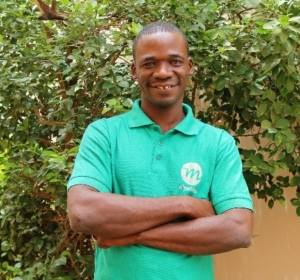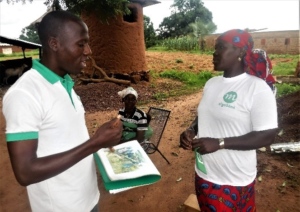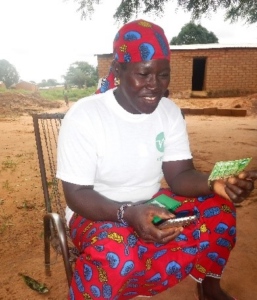After successfully implementing its village entrepreneur model in Senegal (previously “mobile vendor model”), myAgro has decided to expand this model to Mali, where it is currently being tested in the Kadiolo district.

A village entrepreneur mobilizes a farmer.
Moving away from traditional boutiques and putting more power in the hands of village entrepreneurs, this new model will increase program efficiencies and drive down total operational costs.
Through the village entrepreneur model, farmers no longer need to visit their local boutique to purchase myAgro scratch cards. Instead, farmers are visited by their vendor when it’s most convenient for them. With the vendor now the main point person for farmers to reach their payment goals, field agents are able to oversee a larger number of farmers, allowing myAgro to scale more quickly.

Abdoulaye Kone, Regional Coordinator
“myAgro’s goal is to work with one million farmers, so we’re always looking for ways to make the program as efficient as possible,” explains Abdoulaye Kone, Regional Coordinator of Mali. “The village entrepreneur model will allow us to reach a larger number of farmers. This will have a significant impact on the quality of the program as farmers will be better served through myAgro and food security will be better ensured in the villages. We know that any change brings a lot of challenges, but the entire myAgro team in Mali is enthusiastic about this innovation. We hope to be able to adapt this model to all districts in Mali next year.”
Equipped with a smartphone and myAgro’s mobile applications, village entrepreneurs now take on a more proactive role than traditional myAgro vendors. Their new responsibilities include marketing myAgro inputs to farmers, helping farmers select the right package for their farms, and monitoring farmers’ progress toward their layaway goals.

Village entrepreneur Fatou Coulibaly receives a marketing training from her field agent.
“I am very happy that the test phase of the new model was in my district,” says Ibrahima, Field Coordinator of Kadiolo. “During the two years of testing, the yields of Kadiolo’s farmers has only increased. The main reason is because the village entrepreneur model frees up field agents’ time, allowing them to focus on quality control and high-impact activities like agricultural trainings.”
The response to this new model from vendors themselves has been overwhelmingly positive. Beyond selling scratch cards, through their new role they learn skills like how to navigate the smartphones and conduct financial planning with farmers while working independently.

Village entrepreneur Fatou submits a farmer’s payment on her smartphone.
“What I like most about this job is the closeness I have with the farmers of my village,” explains village entrepreneur Fatou Coulibaly. “I am proud to see that the inputs they have are high quality. Also, being a village entrepreneur for myAgro has allowed me to thrive as a woman and to be more independent. Now I know how to mobilize farmers with a phone and my new relationship with them also serves me in my everyday life.”